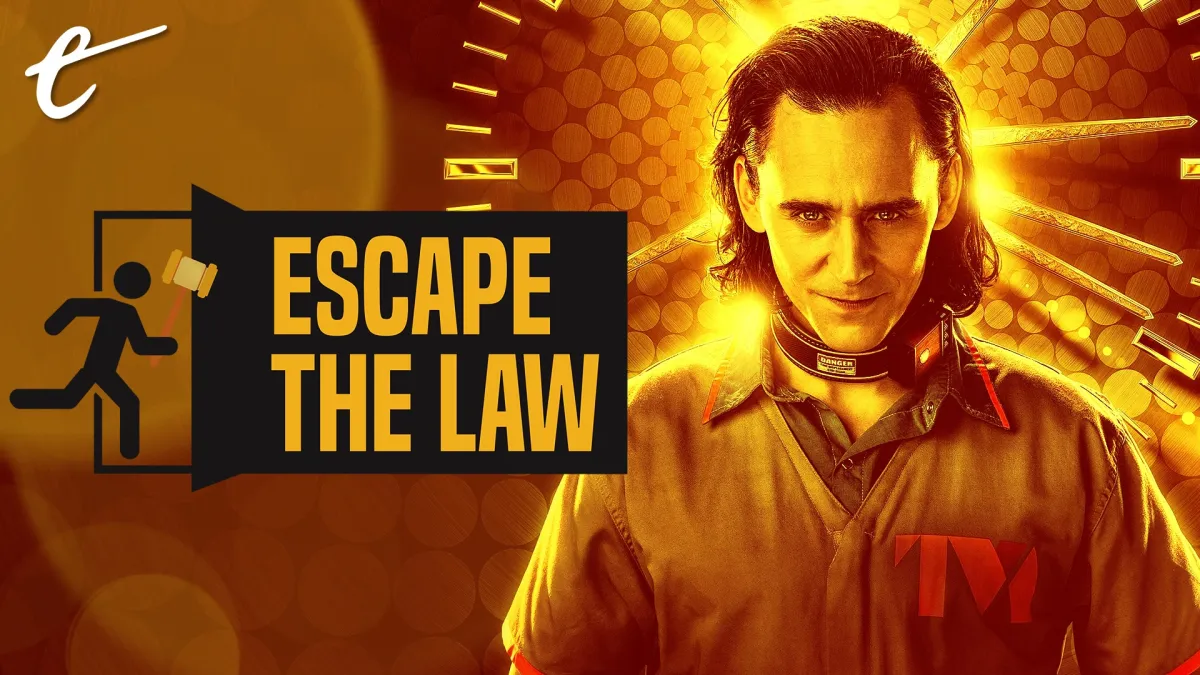Long-time readers of this column will know that I’ve written a lot about spicy time travel, and everyone else will know that I’m interested in themes of law and justice. (It’s in the column name, after all!) Unfortunately, while there was much to like about the Loki premiere, I can say that the depiction of the “Time Variance Authority” (TVA) — and, in particular, of the TVA’s time-court proceedings — was pretty disappointing. For those of you who haven’t seen it yet, here’s the short, one-sentence version: After escaping with the Tesseract in Endgame, Loki is quickly apprehended by the TVA, placed on trial for his crimes, and found guilty.
The central problem is that the time-court proceedings are incoherent and unprincipled. What is it, exactly, that Loki is being accused of? One might think he would be tried for his various heinous acts — murder, collaboration with Thanos, attempted fratricide, attempted coup, etc. But no! This is a time court. The TVA doesn’t care about what actually happens in the world — it’s only interested in preserving the integrity of the timeline. Or is it? What is it that Loki actually did to harm the timeline? As it turns out — nothing.
Loki did not time travel, nor did he abscond with a time-displaced object. Instead, he simply took the Tesseract that was plopped in front of him by time-displaced Avengers, only to be apprehended moments later by TVA officers. Thus, if anyone interfered with the integrity of the timeline, it was the Avengers by trying to steal the Tesseract in the first place.
Loki specifically points out this discrepancy to the TVA, to which it responds: “We’re not here to talk about the Avengers. What they did was supposed to happen. [Loki] escaping was not.” But the TVA can’t have it both ways. It makes no sense — and cannot be considered “fair” — to say that an action is allowed, but the direct consequence of that action is not. That would be like saying there’s nothing wrong with pushing an old lady off a cliff and that the real criminal in that instance is the old lady who decided not to stop before hitting the ground.
But let’s give the Time Variance Authority the benefit of the doubt. Perhaps there is another way to frame the question. The TVA references “crimes against the Sacred Timeline,” but the better way to frame the question might be in terms of legal status. Perhaps the purpose of the TVA is best understood as locating — and “resetting” — improper “variants.” Under this framing, whether someone is guilty is not a question of right or wrong or legal culpability but is simply a question of cause and effect. Is the accused where they’re supposed to be, or are they on an improper divergent timeline?
In the abstract, there’s nothing wrong with this framing. But it becomes highly objectionable once one adds the layers of a criminal justice system on top. Once one does that, it’s hard not to recognize obvious parallels between the Time Variance Authority’s time law in Loki and America’s shameful (and ongoing) immigration and anti-miscegenation laws, under which individuals can be deemed criminals simply by nature of their race, birth country, or some other characteristic outside their control. In Loki, we have a person who was deemed guilty and subject to punishment not because he actually did anything wrong, but because of his status as an improper “variant.” Needless to say, this is probably not what Disney was going for.

The Time Variance Authority doesn’t get any better as we dig deeper. The primary motivation for the TVA seems to be dedication to “the Sacred Timeline.” But what is it about that timeline that makes it worth preserving above others? In an earlier article, I considered a similar question and argued that individuals caught in a time loop have an obligation to help others avoid injury — at least for the last iteration of the loop. The TVA seems to buy in to the utility-maximizing theory.
Loki briefly explains that the TVA exists to prevent wars between various alternate timelines and suggests that if the Sacred Timeline is not defended, then all time may cease to exist. If we take that as true, then the TVA’s actions make sense. But at least at this point, that answer seems unprincipled and arbitrary. Why is it that the Avengers are allowed to time travel without being classified as variants, while others are not? Why are some “branched” timelines acceptable, while others need to be pruned? If preserving the Sacred Timeline is so important and Loki plays a key role in that timeline, then why is it acceptable for the TVA to extract Loki from his timeline and expose him to risky — and potentially deadly — situations, which might prevent him from fulfilling his role in the “Sacred Timeline”?
Admittedly, we’re only one of six episodes in, and there is plenty of time for the show (and potential Marvel Cinematic Universe follow-ups) to answer these questions. For now though, it seems like Loki is more concerned with questions of free will: If there is a Sacred Timeline and history is already written, then how can anyone be held accountable for anything? It’s a good question, veritable catnip for philosophers, religious scholars, and college freshmen.

And while Loki attempts to engage with that question, its use of the Time Variance Authority justice system undermines anything it might hope to accomplish and resolves the paradox in the worst possible way. The fact that Loki (and others) can be charged with deviation from the Sacred Timeline shows that MCU characters do have free will, but they are necessarily prohibited from exercising it. Anyone who attempts to deviate from their established path will swiftly be arrested, charged, found guilty, and “reset.”
It may be that the MCU created these problems on purpose and that the TVA — or the time-keepers who control the TVA — are secretly the villains of this mini-series. Some of the dialogue in the first episode suggests that may be the case. In one of the more interesting scenes, Loki tries and fails to justify his efforts to conquer Earth by arguing that humans would be happier if they had no free will. It’s easy to see how Loki might grow over the course of the mini-series, to the point where he presents the opposite argument to time-keepers, so as to persuade them to dispense with the “Sacred Timeline” and let people decide their own fate. In truth, that is a twist I’d love to see.
For now, though, even though I enjoyed the premiere of Loki, when it comes to the show’s depiction of the Time Variance Authority and the time courts, I have no choice but to echo Loki’s plea before the TVA: How do I plead? “Guilty of finding all this incredibly tedious? Yes.”





